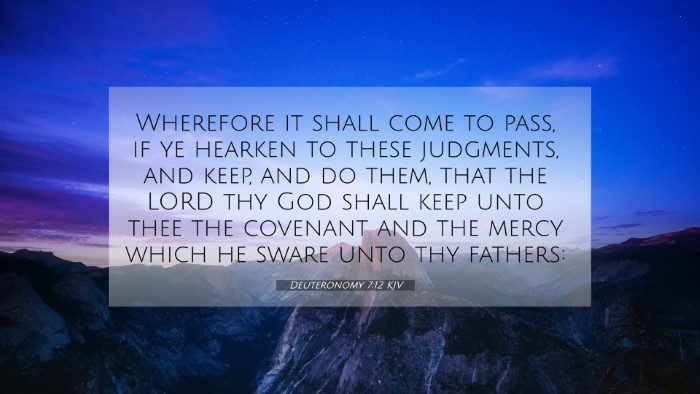Understanding Deuteronomy 7:12
The verse Deuteronomy 7:12 states:
"Therefore it shall come to pass, if you heed these judgments and keep and do them, that the Lord your God will keep with you the covenant and the mercy which He swore to your fathers."
This verse emphasizes the conditional aspect of God's covenant with the Israelites, highlighting the importance of obedience to His commandments. Through a combination of various commentaries, we can explore its deeper meanings and implications.
Meaning and Insights
In the commentary by Matthew Henry, it is noted that obedience is a prerequisite for receiving God's blessings. The verse indicates that by adhering to God's ordinances, the Israelites would experience the fulfillment of His promises, which include protection and mercy. The underlying principle of maintaining a relationship with God through obeying His laws aligns with the consistent themes found throughout the Scriptures.
Albert Barnes expands on this understanding by explaining that the term "keep" implies a deliberate and continual observance of God’s instructions. This commitment ensures that God's promises of mercy and covenant are upheld. He emphasizes God's faithfulness in contrast to human frailty. Our part is to heed the commandments, while God’s part is to maintain His end of the covenant.
Adam Clarke provides insights on the nature of the covenant mentioned. He explains that the covenant represents a solemn agreement, in which both parties have obligations. The Lord's swearing to the fathers denotes His enduring faithfulness, while human obedience is highlighted as essential for a thriving relationship with God.
Thematic Connections
The themes of obedience and covenant are prevalent throughout both the Old and New Testaments. Below are several key Bible cross-references that link and illuminate the themes found in Deuteronomy 7:12:
- Exodus 19:5-6: "Now therefore, if you will indeed obey My voice and keep My covenant, then you shall be a special treasure to Me above all people."
- Leviticus 26:3: "If you walk in My statutes and keep My commandments, and perform them, then I will give you rain in its season."
- Joshua 1:8: "This Book of the Law shall not depart from your mouth, but you shall meditate in it day and night, that you may observe to do all that is written in it."
- John 14:15: "If you love Me, keep My commandments." This New Testament reference mirrors the Old Testament calls for obedience.
- Romans 11:22: "Therefore consider the goodness and severity of God: on those who fell, severity; but toward you, goodness, if you continue in His goodness." This illustrates the conditional aspect of God's favor.
- Hebrews 8:10: "For this is the covenant that I will make with the house of Israel after those days, says the Lord: I will put My laws in their mind and write them on their hearts."
- 1 John 2:3-4: "Now by this we know that we know Him, if we keep His commandments. He who says, 'I know Him,' and does not keep His commandments, is a liar."
Exploring Conditional Blessing
The mention of God's mercy reveals a recurrent theme about divine grace being closely linked to human actions. As observed from the cross-referenced themes, the principle remains the same: the blessings contingent upon obeying God's commands are echoed throughout different parts of the Bible. Scholars agree that this encapsulates a broader theological truth that spans across both the Old and New Covenants.
Practical Applications
What does Deuteronomy 7:12 mean for believers today? Firstly, it establishes the importance of obedience as fundamental to experiencing God's favor. As such, individuals are encouraged to reflect on their own lives and consider how they are living in accordance with God's Word. This verse serves as a reminder that God's love is coupled with His expectations, propelling us towards a more profound connection with Him.
Conclusion
In summary, Deuteronomy 7:12 offers rich theological insights into the nature of the covenant between God and His people. Through the interpretations gleaned from Matthew Henry, Albert Barnes, and Adam Clarke, along with the additional scripture references, one can appreciate the interconnectivity of Scripture and gain a deeper understanding of God’s expectations and promises. Believers are invited not only to meditate on these verses but also to engage in cross-referencing different biblical texts to discover thematic connections, thereby enriching their spiritual journey.
Tools for Cross-Referencing
For those looking to dive deeper into scripture studies, there are several tools for Bible cross-referencing available:
- Bible concordance for finding related verses
- Cross-reference Bible study guides
- Comprehensive Bible cross-reference materials for in-depth study
- Bible reference resources for easy access to connections
- Bible chain references that illustrate broader themes
Exploring these connections can foster a more profound understanding of not just individual verses, but the overarching narrative of scripture.









